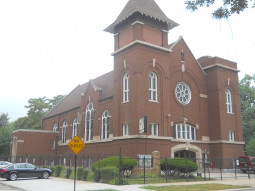<<< back< prevnext >

Article:
Church Foreclosure and Bank Real Estate Tax Exposure

Bank foreclosures on church properties are a relatively rare occurrence. Only about 1.1% of churches close each year (around 3,707 Christian churches per year between 2000 and 2005). Many of these closures may include the orderly disposition of properties. Most lending institutions are reluctant to foreclose on a church because of the potential for negative publicity. Nevertheless, in some situations banks are forced to foreclose on a church and take possession of the property.
We were recently confronted with this scenario in a Chicago church appraisal and the question of real estate tax liability to the bank was brought up. While a church is a not-for-profit and tax exempt, what would become the status of this exemption if a bank takes back the property? What are the real estate tax implications? The issue came up for a church property in Cook County (Chicago), Illinois and that is where we directed our inquiry.
Our church appraiser consulted several law firms and accountants that specialize in real estate tax issues. They all agreed that the new owner is not a tax exempt organization and if the building is now "dark" there would be no tax exempt use.
In Cook County not-for-profits are required to submit an affidavit every year that warrants the property continues to be owned and used for exempt purposes. With a change in status the property should be put back on the tax rolls. This Chicago church property could go for a time without being assessed if the assessor has no notice of the change. Should the assessor become aware of the omitted assessment then the bank could have some exposure for back taxes plus penalties and interest which must be considered by the church property appraiser.
The amount of tax exposure would also be dependent upon the market value estimate of the church or house of worship put on the property by the assessor. Should the assessment be too high an assessment appeal could be considered. In Cook County if the property is 100% vacant for a year the bank could ask for vacancy relief. In Cook County they would not modify the land value but might reduce the improvement value by as much as 80% or 90% (although they need to be re-requested every year). Other counties have no set policy on the issue and take a more ad hoc approach to vacancy issues that are treated more on a case by case basis.
Every County and State is different, however, and the issue could be treated differently. Real estate assessments are tricky around issues that are a little out of the box for most banking professionals and we would recommend consulting a tax attorney who is well versed in the subject.
We were recently confronted with this scenario in a Chicago church appraisal and the question of real estate tax liability to the bank was brought up. While a church is a not-for-profit and tax exempt, what would become the status of this exemption if a bank takes back the property? What are the real estate tax implications? The issue came up for a church property in Cook County (Chicago), Illinois and that is where we directed our inquiry.
Our church appraiser consulted several law firms and accountants that specialize in real estate tax issues. They all agreed that the new owner is not a tax exempt organization and if the building is now "dark" there would be no tax exempt use.
In Cook County not-for-profits are required to submit an affidavit every year that warrants the property continues to be owned and used for exempt purposes. With a change in status the property should be put back on the tax rolls. This Chicago church property could go for a time without being assessed if the assessor has no notice of the change. Should the assessor become aware of the omitted assessment then the bank could have some exposure for back taxes plus penalties and interest which must be considered by the church property appraiser.
The amount of tax exposure would also be dependent upon the market value estimate of the church or house of worship put on the property by the assessor. Should the assessment be too high an assessment appeal could be considered. In Cook County if the property is 100% vacant for a year the bank could ask for vacancy relief. In Cook County they would not modify the land value but might reduce the improvement value by as much as 80% or 90% (although they need to be re-requested every year). Other counties have no set policy on the issue and take a more ad hoc approach to vacancy issues that are treated more on a case by case basis.
Every County and State is different, however, and the issue could be treated differently. Real estate assessments are tricky around issues that are a little out of the box for most banking professionals and we would recommend consulting a tax attorney who is well versed in the subject.



